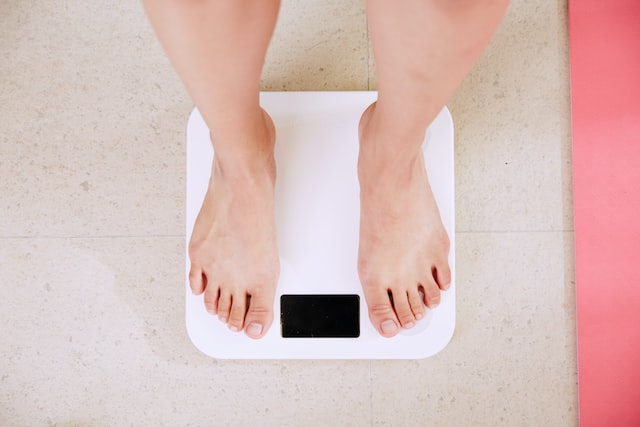It’s frustrating when the scale keeps creeping upward, even when you’re barely eating. A common mistake most people make is thinking that weight gain results from consuming more calories than your body burns.
It’s true that taking in more calories than you expend will earn you a few pounds of body weight. But there are other hidden reasons you may be eating less but adding weight.
If you’re struggling with unintentional weight gain, these 8 reasons may be to blame.
Possible Causes of Your Unintentional Weight Gain
1. Missing Out On Quality Sleep
Poor quality sleep has long been thought to lead to weight gain. Now researchers have found several solid links between sleep deprivation and obesity. A recent study in Current Biology showed that the sleep-deprived group had gained 2-3 pounds in body weight during the two-week study.
Even more interesting, the researchers found that catch-up sleep during weekends didn’t make any difference. So, what’s the sleep-weight connection?
Experts say sleep-deprived individuals tend to eat more due to the actions of two nightly hormones- ghrelin and leptin. Ghrelin signals your brain when it’s time to eat and tends to increase when you’re sleep-deprived. Leptin, on the other hand, tells your brain when it’s time to stop eating. Short sleep duration is known to cause leptin reduction.
Poor sleep also leaves you less motivated to engage in physical activities. This will certainly lead to an increase in your waistline over time.
2. Eating Too Little
We hate to burst your bubble, but eating less won’t necessarily lead to weight loss. In fact, it may trigger your body to go into “starvation mode.” This is when your body worries that it’s starving, so it holds on to whatever calories it gets.
Eating too little doesn’t automatically lead to weight gain. But when your metabolism slows down and the scale doesn’t move, it’s easy to give up and get back to unhealthy diet habits. This may ultimately lead to weight gain. That’s why fad diets that promise dramatic weight loss results only lead to more frustrations.
Solution? Stop viewing calories as your enemy. Instead, embrace a reasonable plan that trains your body on how to burn fat in a sustainable way.

3. Poor Exercise Habits
Another possible reason for your unexplained weight gain is something you know too well- lack of physical activity. There’s no beating around the bush here: if you’re not getting enough exercise, then you’re burning fewer calories than you consume. When this happens, your body has no choice but to store extra calories as body fat.
That could be why you keep seeing a higher number on the scale even after passing on the pizza and cutting desserts from your weight loss regimen.
This is especially true if you have a sedentary lifestyle, as your body burns fewer calories when you’re not moving.
4. It Could Be Hormonal
An increase in body weight without trying could also be caused by hormonal imbalances. This is called hormonal weight gain and can only be fixed by keeping the hormones within healthy levels.
When discussing hormones and weight gain, your doctor may start by determining whether you have insulin resistance. When your cells resist insulin, they cause elevated blood sugar levels. This excess blood sugar is stored as fat, leading to unintentional weight gain.
Many other hormones cause unexplained weight gain when they get out of balance besides insulin. For example, high levels of cortisol (stress hormone) can increase your appetite and cravings for unhealthy foods, leading to weight gain. Other hormones that may trigger weight gain include thyroids, leptin, ghrelin, and estrogen.

5. Underlying Medical Reasons
Before beating yourself so much for gaining weight for no reason, check whether there are underlying medical conditions to blame. Conditions such as polycystic ovary syndrome (PCOS) and hypothyroidism can interfere with how your body processes and stores calories.
Depression and anxiety are also associated with poor food choices and overeating, which can add pounds. Similarly, insomnia can interfere with hormones responsible for hunger and satiety. This may sabotage your self-control, leading to unhealthy food choices.
Regular health check-ups can help identify early signs of these medical conditions. Moreover, your doctor may help manage weight gain due to medical reasons.
6. It May Be Genetic
Your genetics can also play a role in your risk of gaining weight. Some people are genetically fated to gain weight more easily than others, and their bodies may be less efficient at burning calories.
You’re more likely to struggle with it if weight gain runs in your family. But that doesn’t mean that getting fit is out of control for you. Although genetics can impact weight loss and weight gain, your fitness level comes down to how you live. Regular physical exercises, limiting alcohol, and getting smart with your food choices are ways to stop fat genes from making you unintentionally fat.

7. It’s Normal As You Age
It’s natural to gain up to pounds per year as you age. As old age starts creeping in, you’ll experience age-related muscle loss and declined metabolism, all of which may lead to weight gain.
Your metabolism is the rate at which your body burns calories, which tends to decrease as you age. On the other hand, losing lean muscles means your body starts burning fewer calories than it used to when you were younger. That means unplanned weight gain is likely even if you’ve not increased your food portion size.
Other reasons behind age-related weight gain include normal hormonal changes, minimal movement, and major lifestyle changes.
8. You’re Retaining Too Much Water
Water retention- also known as edema- is when your body stores excess body fluids instead of eliminating them. Temporary water retention, which doesn’t last longer than a week, is not a cause for concern. It can be relieved by reducing salt intake and increasing magnesium intake. However, severe water retention may be a sign of a serious underlying condition that probably requires medical intervention.
Here are 5 tips for how to reduce water weight effectively;
- Cut carbs
- Increase your potassium intake
- Embrace a low-salt diet
- Exercise regularly to release extra water
- Take water pills (as described by a doctor)


































